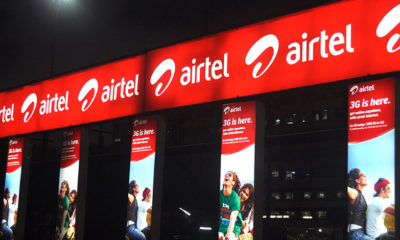Airtel Africa Plc, a leading telecommunications giant in Africa, has reported a 9.7% increase in its customer base to 147.7 million as the penetration of mobile data and mobile money services continued to rise.
This has resulted in a 23.0% increase in data customers to 59.8 million and a 23.1% increase in mobile money customers to 36.5 million, the company disclosed in its first half of the year financial result.
Mobile money transaction value increased by 45.3% in constant currency with Q2’24 annualised transaction value of $116bn in reported currency.
Financial performance
• Revenue in constant currency grew by 19.7%, with reported currency revenues up by 2.3% to $2,623m. In Q2’24, reported currency revenues declined by 4.7% reflecting a full quarter’s impact of the Nigerian naira devaluation in June 2023. Q2’24 constant currency revenues increased by 19.0%.
• Whilst reported currency revenue growth was impacted by currency devaluation, all segments delivered double-digit constant currency revenue growth. Across the Group mobile services revenue grew by 18.3% in constant currency, driven by voice revenue growth of 11.5% and data revenue growth of 28.1%. Mobile money revenue grew by 30.9% in constant currency.
• EBITDA increased by 21.2% in constant currency, and 3.7% in reported currency to $1,302m, with an EBITDA margin of 49.6%, reflecting a 70bps margin improvement over the prior period despite inflationary cost pressures and foreign exchange headwinds. Reported currency EBITDA declined by 3.3% in Q2’24 as the full impact of the Nigerian naira devaluation in June 2023 was incorporated.
• Loss after tax was $13m driven largely by a foreign exchange loss of $471m recorded in finance cost before tax and $317m after tax because of the devaluation of the Nigerian naira in June 2023. This impact has been classified as an exceptional item.
• EPS before exceptional items was 7.0 cents, an improvement of 3.2%. EPS before exceptional items and excluding foreign exchange and derivative losses was 10.7 cents. Basic EPS at negative (1.5 cents) compared to 7.9 cents in the prior period, was impacted by $317m net exceptional loss on account of naira devaluation in June 2023.
Capital allocation
• Capex of $312m was marginally higher compared to the prior period. Capex guidance for the full year remains between $800m and $825m as we continue to invest for future growth.
• The remaining debt at HoldCo is $550m, falling due in May 2024. Cash at the HoldCo was $495m at the end of the period and the Group is well positioned to fully repay the HoldCo debt when due. Leverage of 1.3x in September 2023, was broadly stable despite the foreign exchange impact on EBITDA as a result of the Nigerian naira devaluation in June 2023.
• The Board has declared an interim dividend of 2.38 cents per share, an increase of 9%, in-line with our progressive dividend policy.
Sustainability strategy
• Our landmark five-year $57m partnership with UNICEF was launched across nine of the 13 of our markets providing access to educational resources, free of charge, on our way to reaching one million children through our programmes by 2027.
• Net zero journey continues with implementation of Scope 1 and 2 emissions reductions and development of a robust Scope 3 strategy, including stakeholder engagement.
Olusegun Ogunsanya, Group chief executive officer, on the trading update said “I am pleased to report a strong operating performance for the Group despite foreign exchange headwinds in many of our markets and specifically in Nigeria.
“The resilient growth in voice, data and mobile money usage levels reflects the inherent demand for these essential services across our footprint, and our six-pillar ‘win-with’ strategy continues to ensure we capture this growth opportunity by expanding our customer base and providing the platform to enable increased usage across the network. This strong momentum is supported by continued cost efficiencies which enabled further EBITDA margin expansion.
“As reported in July 2023, our results for the first quarter were significantly impacted by the changes to the FX market in Nigeria, introduced by the Central Bank. Whilst the changes are required for the long-term benefit of the Nigerian economy, the immediate impact of the naira devaluation continues to weigh on our reported financial performance in the period.
“Our focus remains to enhance long term value by continuing to drive sustained and efficient growth. Over the last five years we have delivered constant currency revenue and EBITDA CAGR of 17.1% and 20.7% respectively, allowing us to further derisk the balance sheet and improve profitability across the Group.
“Looking forward, the delivery of affordable and reliable telecom and mobile money services across our markets remains our key focus. Our strong operating performance continues to make us a stronger and bigger company, which is well positioned to deliver against the growth opportunities these markets offer.
“Despite the challenges of rising diesel prices in Nigeria, we aim to limit the impact with continued operational leverage and further cost efficiencies to deliver an improved EBITDA margin in FY’24 versus FY’23.”


 Naira4 weeks ago
Naira4 weeks ago
 Naira4 weeks ago
Naira4 weeks ago
 Travel4 weeks ago
Travel4 weeks ago
 Jobs4 weeks ago
Jobs4 weeks ago
 Naira4 weeks ago
Naira4 weeks ago
 Naira3 weeks ago
Naira3 weeks ago
 Investment4 weeks ago
Investment4 weeks ago
 Travel4 weeks ago
Travel4 weeks ago



















